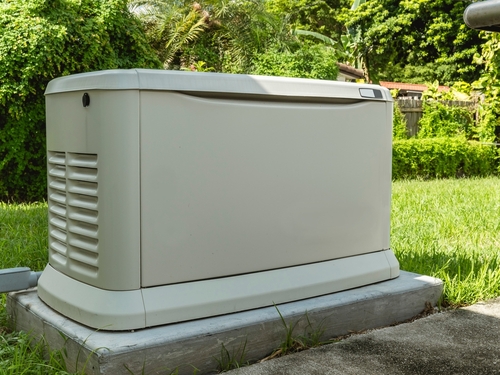Imagine this: A summer storm rolls in, lightning flashes, and just like that—your power goes out. Your fridge stops humming, your air conditioning shuts down, and you’re left sitting in the dark, spoon-deep in a tub of rapidly melting ice cream.
If this scenario feels all too familiar, you’ve probably wondered whether a home generator is worth the investment. Will it be your hero in times of darkness, or just another expensive gadget collecting dust next to that treadmill-turned-clothing rack?
As your trusted local experts in home comfort, Environment Masters has helped Mississippi homeowners keep their homes running smoothly—storm or shine—for over 60 years. This guide will break down the benefits of owning a generator, different types of generators, and help you decide whether or not this is a worthy investment for your household.
The Benefits of Owning a Home Generator
A home generator isn’t just a fancy way to flex on your neighbors during a blackout—it’s a practical safeguard against the unexpected. Here’s why many homeowners consider it a must-have:
- Reliable Backup Power – Keeps your lights, fridge, HVAC, and essential appliances running when the power decides to take a vacation.
- Peace of Mind – No more scrambling for flashlights, worrying about spoiled food, or realizing how much you truly rely on WiFi.
- Home Value Boost – Whole-home generators can increase resale value because future buyers love convenience.
- Protection Against Power Surges – Helps keep your electronics safe when the power kicks back on unexpectedly.
At Environment Masters, we install and service whole-home generators that provide automatic, seamless power whenever the grid goes down. That means no hassle—just peace of mind.
Whole-Home vs. Portable Generators: What’s Best for You?
Choosing a generator is a bit like dating—some options are high-maintenance but reliable, while others are more affordable but require a little extra effort.
Whole-Home (Standby) Generators
Whole-home generators are the VIPs of backup power. Permanently installed, they fire up automatically when the power goes out—no effort required.
Pros:
- Powers your entire home, including HVAC systems, well pumps, and large appliances.
- No manual setup—turns on automatically.
- Runs on natural gas or propane, so no need to stockpile fuel.
Cons:
- Higher upfront cost (purchase and installation).
- Requires professional maintenance to keep it in top shape.
Best for: Homeowners who experience frequent or long-lasting power outages and want a hassle-free solution. If you have medical equipment, work from home, or just don’t want to risk going without AC, this is the best choice.
Portable Generators
Portable generators are the budget-friendly, do-it-yourself option. They’re great for short-term outages or when you need to power a few essentials.
Pros:
- More affordable than whole-home generators.
- Can be used for camping or tailgating.
- No installation required.
Cons:
- Requires manual setup, which is fine when it’s sunny…less so in a storm.
- Limited power supply—so it’s lights or air conditioning, not both.
- Needs refueling, and storing gasoline safely can be tricky.
Best for: Homeowners who only need to power a few essentials and don’t experience frequent outages.
EMI Note: We don’t install portable generators, but if you go this route, make sure to never run one indoors due to carbon monoxide risks.
Fuel Source Considerations
Not all generators run on the same type of fuel, so choosing the right one is key.
Natural Gas (Best for Whole-Home Generators)
- No refueling—connects directly to your home’s gas line.
- More affordable and widely available.
- Burns cleaner than gasoline or diesel.
Propane (Can Be Used for Both Whole-Home and Portable Generators)
- Easy to store with a long shelf life.
- Ideal for homes without natural gas connections.
- Produces lower emissions than gasoline or diesel.
- Many natural gas generators can be converted to propane for flexibility.
Gasoline and Diesel (Used for Portable Generators)
- Readily available but must be stored safely.
- Short shelf life—gasoline starts going bad in a few months.
- Diesel generators tend to be more fuel-efficient.
Is a Home Generator Worth the Investment?
A home generator can be a life-saver if you lose power frequently. But is it really worth the investment? Here’s what to consider before you commit:
- How often does your area lose power? If blackouts are rare, a generator might not be a top priority. If outages are a regular event, it’s worth serious consideration.
- What appliances do you need to power? If you just want to keep the fridge running and charge your phone, a portable generator works. If you want full home comfort, go with a whole-home unit.
- What’s your budget? Whole-home generators cost more upfront but provide seamless power. Portable generators are more budget-friendly but require hands-on operation.
- Do you want to increase your home’s value? Standby generators boost resale appeal since many homebuyers value built-in backup power.
Should You Buy a Generator?
At the end of the day, a generator is like an insurance policy—you hope you don’t need it, but you’ll be glad you have it when disaster strikes.
- If you want uninterrupted power for your entire home, go with a whole-home generator, especially if you have natural gas access.
- If you just need temporary, emergency power, a portable generator may be a cost-effective solution.
- If power outages are rare in your area, you might be better off investing in some good flashlights and extra supplies.
Let EMI Help You Choose the Right Generator
At Environment Masters, we specialize in hassle-free whole-home generator installation and service. We’ll assess your power needs, fuel options, and budget to help you choose the best backup power solution. And our ongoing generator maintenance will keep you powered up for when you need it most
Call us today at (601) 300-2564 for a free consultation.
Because sitting in the dark with melted ice cream should be a choice, not a necessity.

